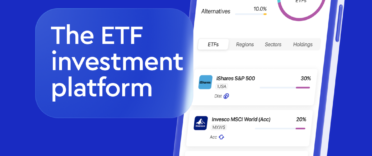 In this independent review, we take a look at the multi-asset investment platform Saxo, including how it works, its key features and fees. We also explore alternatives to Saxo such as eToro*.
In this independent review, we take a look at the multi-asset investment platform Saxo, including how it works, its key features and fees. We also explore alternatives to Saxo such as eToro*.
What is Saxo?
Saxo is an award-winning multi-asset investment platform serving more than 1.2 million clients in 170 countries. In 2024, it won the BrokerChooser Best Trading Platform award as well as the 2024 #1 Platform & Tools Forex Brokers award.
The company is headquartered in Copenhagen, Denmark but it is authorised in multiple jurisdictions including the UK where it's regulated by the FCA. It first launched in 1992 and describes itself as a "fintech pioneer".
How does Saxo work?
Saxo aims to appeal to a wide range of investors with lots of different account options such as general investment accounts, ISAs, and SIPPs. It does not have a minimum investment amount and there are no inactivity fees, making it easy to open an account, especially for infrequent investors or those that do not have a large sum to invest. For longer-term investors, there are stocks, ETFs, bonds and funds on offer.
Those interested in leveraged products will find a range of possibilities including CFDs, futures, Forex, and other commodities. That said, leveraged products are considered a high-risk way to invest your money. Saxo claims that 64% of retail investors who use the platform lose money when trading CFDs.
While pricing is relatively competitive, the best prices and most personalised customer service are reserved for those who make large initial deposits or who make high-volume trades due to the tiered pricing structure.
Saxo offers a range of unique features that set it apart from the competition. Among them are joint accounts which allow family members to manage investments together. There is also the opportunity to benefit from extended trading hours on major US exchanges.
Saxo key features
Some of Saxo's key features include:
- More than 71,000 investing instruments including stocks, ETFs, funds and bonds
- More than 8,600 CFDs including stocks, indices, forex, commodities, and bonds
- Pre-market (07:00 - 09:30 am Eastern Time) and after-hours (4:00 - 5:00 pm Eastern Time) trading access on major US exchanges including NYSE, Nasdaq, American Stock Exchange and Bats BZX
- Unique trading opportunities including Crypto ETFs that allow you to trade crypto like stocks
- Opportunity to create joint accounts with family members and trade and invest together
- Can earn up to 3.43% interest on uninvested cash although this requires at least £10,000 (Correct as at 27.11.24)
- Tiered pricing system; investors who deposit at least £1,000,000 initially immediately become VIP tier members and benefit from very low prices and a range of other perks
What can you invest in with Saxo?
Saxo allows you to invest in a range of products including:
- Stocks - More than 23,000 stocks from 50+ global markets
- ETFs - More than 7,400 sectors including tech, healthcare, and the environment
- Bonds - More than 5,200 government and corporate bonds
- Funds - More than 6,000 mutual funds
- Listed options - Listed options on more than 20 exchanges in the US, Europe, and Asia-Pacific region
- Futures - More than 250 futures across 25 global exchanges
- Forex - More than 185 FX pairs including popular options like GBPUSD and USDJPY
- Crypto ETFs and ETNs - Trade Crypto like stocks with a range of ETFs without having to set up a crypto wallet
- CFDs - More than 8,500 stock and ETF CFDs
- Commodities - 20 commodity CFDs including energy, agriculture and metals with a leverage ratio up to 5:1
Some of these options are only appropriate for advanced traders rather than beginner investors.
Saxo accounts
Saxo offers a range of different investment accounts including tax wrappers like ISAs and SIPPs. The accounts most relevant to retail investors include:
- General investment account - Saxo's "individual account" gives you access to 71,000 instruments across a range of global markets
- Joint account - You can open a general investment account with a first-line family member (spouses, siblings, parents, and children who are at least 18+ years old) to trade 71,000+ instruments across Saxo's platforms
- ISA account - You can open a Stocks and Shares ISA and benefit from tax-free investing of up to £20,000 per tax year (leveraged products are not included)
- SIPP account - You can open an HMRC-approved pension account with Saxo and invest in a range of assets such as stocks and ETFs (but not leveraged products)
- Trust account - You can invest your trust via Saxo's platform but will need to provide a range of documents to set this up
- Demo account - This account allows you to try out the platform and check out its features before you commit to opening a full account.
There are other options too, including corporate accounts and professional accounts, but they are unlikely to be suited to retail investors. The professional account requires a qualification, while the corporate account is designed for those who want to invest on behalf of their companies.
Saxo platforms
There are three different investment platforms on Saxo designed to suit different investors' trading and investment needs. These platforms include:
- SaxoInvestor - A simplified, mobile-optimised, user-friendly platform designed for quick and secure investments for those who wish to invest in stocks, funds, ETFs, and bonds.
- SaxoTraderGO - Saxo's award winning investment platform designed for investors looking for more advanced features.
- SaxoTraderPRO - Saxo's professional-grade investment platform with advanced trading features designed for high-volume, active traders.
Retail investors planning to hold assets long-term or low to mid-volume traders will likely find that Saxo Investor and Saxo TraderGo are the best options for their needs. Advanced, high-volume investors can take a look at SaxoTrader Pro instead. All three platforms have demo previews on the website allowing potential investors to try out the features available and decide which platform suits them best.
What are Saxo's pricing tiers?
Saxo operates a pricing tiers structure which means that the more money you invest or the more frequently you invest, the lower the prices you'll achieve. You can be placed into the Classic, Platinum, and VIP accounts, depending on how much you deposit initially (within 30 days of opening your account). But, if you trade often, you can move up the tiers.
Here's a quick overview of how they work.
- Classic - This is the default level when creating an account and there's no minimum deposit required to qualify.
- Platinum - To qualify for this account, you need to deposit at least £200,000 or earn 120,000 loyalty points through actions like making trades, attending events, or referring friends. You'll benefit from everything in the Classic tier, plus up to 30% lower prices and priority support.
- VIP - To qualify for this account, you need to deposit at least £1,000,000 or earn 500,000 loyalty points. You'll get Saxo's best prices, priority customer service, as well as access to Saxo's trading experts, exclusive event invitations including flagship events and invites to "the biggest sporting and entertainment events".
To qualify for a tier via the points system, you need to have accumulated the required number of points in the last three months as well as the month when you intend to join. If you qualify for a tier via the points system, you'll receive a 12-month rolling membership. This means that if you fall under the qualifying points criteria, you'll have a 12-month grace period to earn more points before you are moved to a lower tier.
How much does Saxo cost?
The table below outlines some of the key costs you can expect if you decide to invest with Saxo.
| Type of fee | Cost |
| Transaction fees - US Stocks and ETFs | 0.015USD/Share (Classic)
0.01USD/Share (Platinum) 0.005USD/Share (VIP) Minimum fee - $1 |
| Transaction fees - UK Stocks and ETFs | 0.08% (Classics)
0.05% (Platinum) 0.03% (VIP) |
| Transaction fees - Bonds | 0.2% (Classic)
0.1% (Platinum) 0.05% (VIP) |
| Custody fees - Stocks and ETFs/ ETCs/ Bonds | 0.12% (Classic and Platinum)
0.08% (VIP) |
| Custody fees - Mutual funds | 0.4% (Classic)
0.2% (Platinum) 0.1% (VIP) No commission fees when investing in funds. |
| FX fees (above spot mid-price) | 0.25% |
| Manual order fee (for clients placing orders over the phone, chat or email) | EUR 50 |
| Inactivity fees | None |
What is the minimum deposit with Saxo?
There is no minimum deposit required with Saxo. You can deposit however much you want initially. Your initial deposit needs to be made by a bank or wire transfer, but subsequent funding can be made using a debit card.
While there are no minimum deposits, it's worth keeping in mind that Saxo accounts have three tiers - Classic, Platinum, and VIP. The higher tiers come with lower pricing and better service.
You can work up to the higher tiers by making trades and earning points, but your initial deposit dictates what tier you're placed in when you join. If you invest £200,000 initially, you'll be placed in the Platinum tier and get up to 30% lower prices as well as priority support and if you invest £1,000,000 initially, you'll achieve the VIP tier, including Saxo's best prices and several other perks.
Can you earn interest on uninvested cash with Saxo?
You can earn up to 3.43% interest on your uninvested cash with Saxo. However, interest is only earned on deposits above £10,000 (or equivalent). The best rates are available to those who have balances above £100,000. Someone with £12,000 uninvested cash can only earn up to 0.069% in interest which is very poor relative to the current market.
Is Saxo safe?
Saxo is an FCA-authorised company which safeguards your money by holding it in trust in various segregated bank accounts. This ensures clients' funds are not used in the day-to-day operations of Saxo and in the event that Saxo fails, the money will be returned to them directly.
Saxo also offers FSCS protection which ensures that customers are protected up to £85,000 in the event that Saxo fails and can't pay its clients back due to a client money shortfall. There are, however, mechanisms in place to ensure this doesn't happen, including daily reconciliations to ensure the money in the segregated accounts reflects the amount deposited by clients. The segregated bank accounts are also chosen carefully by analysing various factors such as their balance sheet, credit rating and risk factors.
As such, Saxo offers a secure way to invest your funds.
How to open an account with Saxo
To open an account with Saxo, you'll need to fill out an online application form. This involves completing four sections, including your personal details, finances and tax information, investing experience, and terms of business.
The type of information you'll need to provide includes your full name, date of birth, current address, current occupation, and income. Saxo is required to ask these questions as part of their regulatory responsibilities and in order to verify your identity.
These are fairly standard sections with the types of questions you'll need to answer regardless of the investment platform you select.
Saxo customer reviews
Saxo has a 3.8 out of 5.0 score on Trustpilot based on more than 6,500 reviews. Around 41% gave the trading platform five stars but 37% gave it a one-star score. Those who gave it 5 stars were impressed with the prompt and friendly customer service as well as the intuitive interface and good selection of assets. Those who gave it a 1-star rating, however, faced issues with their accounts being frozen during the sometimes lengthy KYC process as well as technical difficulties.
Saxo alternatives
If Saxo isn't quite right for you, there are a few alternatives to consider. Platforms like eToro* and Trading 212 offer similar features but may work better in some circumstances. Trading 212, for example, offers commission-free trading, which may appeal to lower-volume traders who can't achieve Saxo's higher tiers (and better pricing). eToro offers many of the same assets that Saxo does but also has options like crypto outside of ETFs for those interested in that.
The table below highlights the main fees associated with the three options as well as what they have on offer.
| Saxo | eToro* | Trading 212 | |
| Platform fees | 0.1% to 0.12% depending on asset type and tier | FREE | FREE |
| Commission fees | Varies depending on the asset type | FREE except crypto (1% buy/sell fee + 2% asset transfer fee) | FREE |
| FX fees | 0.25% | 1.5% to 3% depending on currency | 0.15% |
| Stocks and shares ISA | YES | YES | YES |
| SIPP | YES | NO | NO |
| ETFs | YES | YES | YES |
| Shares | YES | YES | YES |
| Leveraged trading (CFDs/Options) | YES | YES | YES |
| Crypto | YES - but only via Crypto ETFs | YES | YES - but only via derivatives |
| Trustpilot score | 3.8 out of 5.0 | 4.2 out of 5.0 | 4.6 out of 5.0 |
Accurate as of November 2024
Saxo pros and cons
Below, we outline some of the pros and cons of investing with Saxo.
Saxo pros
- Huge range of trading instruments (more than 71,000)
- Tax wrappers including SIPPs and ISAs
- Out-of-hours trading for popular US exchanges
- No inactivity fees
Saxo cons
- Low or no interest on uninvested cash unless you have a high balance
- The best prices are available to high-volume traders or those with higher balances
- Custody fees ranging from 0.1% to 0.12% (alternatives like eToro and Trading 212 are free)
- Average Trustpilot reviews
Saxo: Is it the right choice for your investment goals?
Saxo is best suited to those who want (and know how to use) advanced analytical tools as well as those with a lot of money to invest. The best interest rates and the best prices are available to those with the highest balances or those who trade frequently. To get the highest interest rate on uninvested cash, for example, you need at least £100,000. That said, for high-volume traders or those who have a lot of money to invest, Saxo offers excellent rates and a wide range of trading instruments as well as tax wrappers like SIPPs and ISAs. Saxo's FX fees are competitive as well when compared to other alternatives.
For those looking for commission-free trading, alternatives like eToro and Trading 212 offer a similar range of assets and tax wrappers like Stocks and Shares ISAs. These alternatives could be better suited to long-term investors who do not have the cash available to benefit from Saxo's best prices and added perks.
If a link has an * beside it this means that it is an affiliated link. If you go via the link Money to the Masses may receive a small fee which helps keep Money to the Masses free to use. But as you can clearly see this has in no way influenced this independent and balanced review of the product. The following link can be used if you do not wish to help Money to the Masses or take advantage of any exclusive offers – eToro




